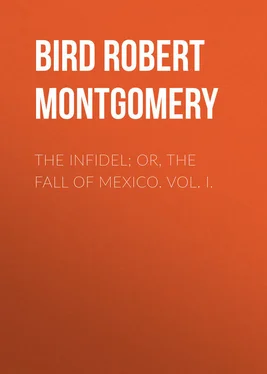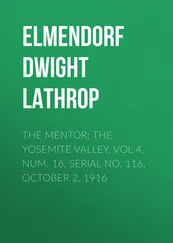"Does any one charge this upon the general?" said Juan, with a look of horror.
"Ay, – if you call them not 'villains,'" replied the soldier.
"I will know the truth," said Juan. "I will find who has belied me."
"You will find that of any one but Don Hernan. Señor Don Juan, I pity you. You have returned at an evil moment; your presence will chill old friends, and sharpen ancient enemies."
"If he seek my life, it is his: but, by heaven, the man who has wronged me, – "
"Get thy horse and arms first. Wilt thou be wise? Thou shalt have friends to back thee. Listen: A month since, there came for thee, in a ship from the islands, two very noble horses, and a suit of goodly armour, sent, as was said, by some benevolent friend, whom thou mayst be quicker at remembering than myself."
"Sent by heaven, I think," said Lerma, "for I know not what earthly friend would so supply my necessities."
"Oh, then," said Villafana, "the rumour is, they were sent thee by the lady Catalina, our general's wife."
"May heaven bless her!" exclaimed Juan; "for she is mine only friend: and this bounty I have not deserved."
"In this matter," said Villafana, dryly, "she will prove rather thine enemy; that is, if thou art resolute to demand the restoration of her gifts."
"The restoration!"
"In good truth, they were distributed among thine heirs; the horse Bobadil, thought by many to be the best in the army, falling to the share of thy good friend Guzman."
"To Guzman?" cried Juan, angrily. "Could they find no better friend to give him to? I will have him back again; yea, by St. Juan, he shall ride no steed of mine!"
"Right!" exclaimed Villafana; "for if thou hast an enemy, he is the man. Thou didst well, to refuse his hand. He offered it not in love, but in treachery. Thou wilt ask Cortes for thy maligner? It needs not: remember Don Francisco."
"I will do so," said Juan, with a sigh. "I thought, in my captivity, when I despaired of ever more looking upon a Christian face, that I had forgiven my enemies. I deceived myself, – I hate Don Francisco. I will proclaim him before the whole army, if he refuse to do me reparation."
"I tell thee, thou shalt have friends," said the Alguazil, with an insinuating voice, "to back thee in this matter, as well as in all others wherein thou hast been wronged. But thou must be ruled. Speak not to Cortes in complaint: he will do thee no justice. Send no defiance of battle to Guzman, for this has been proclaimed a sin against God and the king, to be punished with loss of arms, degradation, and whipping with rods, – sometimes with the loss of the right hand. You stare! Oh, señor Juan Lerma, you will find we have a master now, – a master by the king's patent, – who makes his own laws, beats and dishonours, and gives us to the gallows, when the fit moves him, without any necessity of cozening us to death in expeditions to the gold mines, or the South Seas."
Конец ознакомительного фрагмента.
Текст предоставлен ООО «ЛитРес».
Прочитайте эту книгу целиком, купив полную легальную версию на ЛитРес.
Безопасно оплатить книгу можно банковской картой Visa, MasterCard, Maestro, со счета мобильного телефона, с платежного терминала, в салоне МТС или Связной, через PayPal, WebMoney, Яндекс.Деньги, QIWI Кошелек, бонусными картами или другим удобным Вам способом.
These poems, we presume, were handed down orally . We know not how far the picture-writing of the Mexicans (the art of interpreting which appears to be now lost,) was capable of conveying any such thoughts as could not be represented by an absolute portrait . No system of writing that is not essentially phonetic or dialectical , (i. e. representative of sounds, or of language,) can be made to express abstract ideas, which may be defined to be such as admit of no ideographic or metaphoric representation. If they could, mankind might, at once, enjoy the benefits of the universal language , (or, to speak strictly, a substitute for it; for it would convey ideas not words,) which Leibnitz dreamed of, and Bishop Wilkins, and many others after him, so vainly attempted to construct.
When, therefore, we relate any very curious and marvellous matters, appertaining to Mexican literature , though we speak upon the authority of historians, we invite the reader to receive our accounts with some grains of allowance. With the exception of a few arbitrary symbols, expressive of numerals, and a few other objects of constant recurrence, the picture-writing of Mexico spoke in ideas, not words; and it may therefore be assumed, that it could express nothing that did not, or by a stretch of ingenuity, could not be made to, address and explain itself to the eye.
The Manga and Serape are Mexican cloaks worn scapulary-wise, the one of richly embroidered cloth, the other of blanket, or some such coarse material. The Anquera is a leather housing, embossed and gilt, with a jingling fringe of brass or silver ornaments.
Vasco Nuñez de Balboa.
The historical reader will find that the worthy Bernal has incorporated many of these judicious sentiments in the work he was then composing, and some almost word for word.
Fusta – a sort of galley, very small and open, with lateen sails.
Itzli , the obsidian or volcanic glass.












